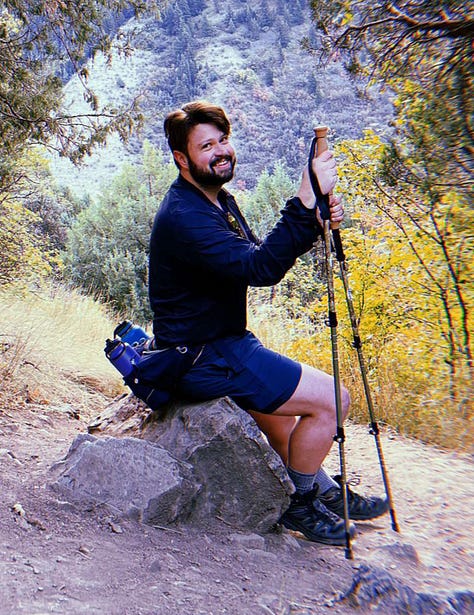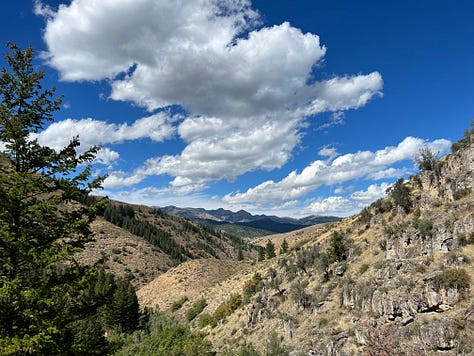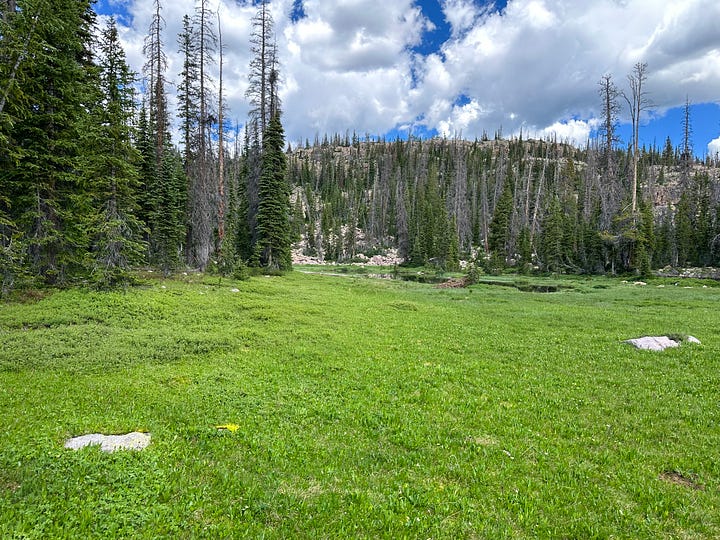Four Questions to Ask Yourself Before Setting That Next Big Goal
You might realize that you are doing it for the wrong reasons.
“Well, maybe I just didn’t really want that.”
The words slipped out before I could stop them. My friend’s mouth fell open, mirroring the shock I suddenly felt. Did I really just say that? Out loud?
Crap, crap, crap.
In my head, I knew it wasn’t true—I had wanted that promotion. I’d been working toward it for ages, wrestling with one setback after another. Finally, once I pushed past the self-sabotage, success felt like a natural next step.
Wait...self-sabotage? Was that what I was doing all along?
Why on earth would I sabotage something so important to me?
“Um, I don’t know where that came from,” I mumbled, trying to smooth over my own confusion.
My friend just nodded, neither of us quite knowing how to handle this unexpected confession.
We tiptoed away from it, shifting into safer territory. Yet the unspoken questions lingered in the air, begging for a deeper look at what I truly wanted—and why I might be standing in my own way.
The Wake-Up Call
11 months after finally landing that promotion, I quit. Surprising right?
As it turned out, I never truly wanted it in the first place—or, at least, not in the way I had convinced myself I did.
Deep down, I knew stepping into that new department meant navigating a culture with little support, and I already had a lot going on in my personal life. I also had a hunch that behind those shiny new responsibilities lurked big, messy politics that would drain my energy further.
It ended up being worse than I suspected.
Still, a New Year’s goal was a goal, and I poured everything I had into achieving it. That promotion took far longer than I expected—and cost me much more than I ever intended to give.
Looking back, I saw the countless ways I’d sabotaged myself along the journey. It’s funny—I devoured self-help books and articles to silence my inner saboteur, yet I never stopped to ask the crucial question: why was I sabotaging myself in the first place?
After the fact, it was obvious that only part of me wanted the goal. The other parts were like, “Hell no.”
And that, my friends, was the last goal I set.
(Cue motivational music...)

Just Kidding: I Still Set Goals.
But here’s the twist—I don’t do it on a strict yearly schedule. Sometimes it’s 3 months, sometimes 9, and rarely 12.
I don’t do well with long time horizons.
I’ve learned that I need an intention to follow them. I also heavily question them every year. I’d like to avoid what happened to me with that promotion.
So, instead of rehashing a step-by-step goal-setting plan, I want to share four questions that I’ve been asking myself this year.
These questions have made me stop and think about a few of my goals. And to keep it real, I’ll share one of my own big annual (gasp!) targets: 25 hikes. (I’m calling it a target, not a goal.) 😉
By the way, that “target” actually started as “lose (and keep off) those last stubborn 25 pounds.” But once I walked myself through the questions below, I realized the weight loss wasn’t really what I wanted after all.
I’ve designed these questions to help you explore these goals deeply and ensure your whole self is on board.
Because there’s nothing worse than reaching a goal and thinking, “Wait...what the hell did I just spend my year chasing?”
(P.S. I’ll provide all four questions at the end of this essay without commentary, so you can copy and paste to your heart’s content.)
1. Would you still chase the same goal(s) if no one ever recognized your achievement(s)? Why or why not?
This question removes external validation from the equation and highlights how much our ambitions might be fueled by others’ opinions instead of our own purpose.
Let’s start with my original goal to lose 25 pounds:
Honestly, if you’d asked me whether I’d pursue it without any recognition, my short answer now would be yes—but I’m not so sure that would’ve been true in the past. Back then, part of me craved being seen as attractive.
I wanted that “admirable body” (I always thought I’d make a pretty great Viking, horned helmet and all).

In those days, weight loss felt more like a shame-removal process than a genuine quest for health…
But this year, I’m focusing on one simple reason for wanting to lose weight: I feel and move better when I’m lighter. Hiking, paddleboarding, and controlling four-wheelers is easier and more enjoyable to me when I’m more agile, lighter, and less fatigued.
Sure, I’d ALSO love it if people stopped saying, “You don’t look like you teach yoga,” just because I’m built a little sturdier. But these days, my motivation revolves more around how I feel than how others perceive me.
That reflection led me to realize my deeper priority: I miss hiking.
I couldn’t hike much in 2024 after my accident, and I want to return to the trails with ease.
When I pivoted my focus from weight loss to 25 hikes, it became far more motivational. After all, I’m hiking simply because I love to hike: to watch birds dancing among the trees, to see my pups roam free, and to take in sights that invigorate my soul.








2. Which of your current goals might exist because you’re afraid of standing still, missing out, or being ‘left behind’? Or, in other words, are you setting a goal because of fear?
This question confronts fear-based goal-setting—those goals we chase to keep up appearances or soothe our anxiety about stagnation. It urges you to see whether your ambitions are truly meaningful, or if you’re just reacting to an underlying fear.
Looking again at my original plan to lose 25 pounds:
When I asked myself this question, it was like being hit by a ton of bricks. My past weight-loss efforts were rooted in fear about my future health. Years ago, when I weighed 300 pounds, a doctor bluntly warned, “If you don’t change now, you will die young.”
That definitely lit a fire under me—I lost 80 pounds that year.

But I also realize that part of my current drive to lose weight might still come from that lingering fear: “You will die young if you don’t lose those last 25 pounds to match that number the doctor gave you.”
Just acknowledging that brings a pit to my stomach.
Look, that visit was traumatic, and I can feel myself rebelling against anything that dredges up those memories. Even more telling is how the number “25” brings me to the original figure the doctor set years ago.
No wonder focusing on weight loss feels icky and triggering.
But when I consider my hiking goal, I feel lighter, more hopeful—like I’m embracing an adventure rather than fleeing from fear. I can hike right now, and there’s nothing wrong with my current weight. Still, I’ll admit there’s a spark of excitement at the possibility of being a bit lighter on the trails—more a forward-looking desire than a fear-based obligation.
3. If achieving your goal fundamentally changes your daily routine or relationships, would you feel excited, overwhelmed, or even resentful?
Here, you’re looking at the real-life implications of success. Working toward and achieving a big goal can alter your lifestyle, workload, or relationships in ways that aren’t always comfortable. It’s a reality check to see if you’re prepared for any side effects.
Like most of us, I don’t have endless hours in the day. If I decide to focus on weight loss or more intense conditioning, that extra time has to come from somewhere else—and that doesn’t exactly fill me with joy.
In fact, changing my daily and weekly routines scares me. I might even resent it because my schedule currently supports what I value and want to accomplish.
I’m not saying my life is a perfect system—trust me, it’s not. But it works well enough that I’m not sure how I’d cram in a 20-minute drive to the gym (plus the return trip) and an hour-long workout multiple times a week.
On top of that, if I manage 25 hikes, that’s fantastic—but it also means using a lot of Sunday mornings that I usually spend writing, which has been incredibly fulfilling. Would I end up resenting those hikes for taking away that creative time? Possibly. And if so, it’s a clue that part of me won’t be on board, at least not yet.
This is exactly how resistance and self-sabotage can sneak in. I’ll need to figure out how my life can accommodate the prep work and the aftermath of a goal like this.
I still have work to do here, friends.
4. Which aspect of you remains ‘under construction’ indefinitely? How much does your goal map to this aspect of the self?
This question raises the issue of endless self-improvement. Growth is healthy, but it can also become a hiding place—a way to dodge the feeling that we’re not quite “enough.” It pushes you to examine whether you’re improving out of genuine desire, or using that “work in progress” label as a shield.
Honestly, I can’t guarantee I’d fully accept myself at 25 pounds lighter… because a scale number doesn’t automatically translate to true health or happiness for me. It’s a target that hasn’t delivered on its “feel better” promise in the past. Even if I hit it, I’d probably still feel unfinished.
That realization is fascinating—and maybe something I’ll explore later.
On the other hand, focusing on 25 hikes aligns better with who I am. It emphasizes what I actually love to do and naturally increases my activity level—something that genuinely supports my sense of well-being.
My diet is already balanced; drastically changing it won’t yield much more benefit. Ultimately, chasing what brings me joy (rather than obsessing over numbers) keeps me from feeling trapped in a perpetual construction zone.
At the end of the day, there’s no one-size-fits-all formula for setting goals—just the questions we ask ourselves and the honesty we bring to our answers.
Understanding why I’m pursuing something has become just as important as what I’m pursuing, if not more so. Shifting my focus from “lose 25 pounds” to “enjoy 25 hikes” isn’t just a change of wording—it’s a mindset shift that better aligns with who I am and what I really want out of life.
If you’re feeling that urge to set grand resolutions (or to scrap them entirely), I invite you to walk through these questions and see what resonates:
Would you still chase the same goal(s) if no one ever recognized your achievement(s)? Why or why not?
Which of your current goals might exist because you’re afraid of standing still, missing out, or being ‘left behind’? Or, in other words, are you setting a goal because of fear?
If achieving your goal fundamentally changes your daily routine or relationships, would you feel excited, overwhelmed, or even resentful?
Which aspect of you remains ‘under construction’ indefinitely? How much does your goal map to this aspect of the self?
And for extra credit…
Are you driven by a genuine desire, or an old story about who you should be? Are you open to the real-world consequences of success, or do they fill you with dread? And most importantly, does your goal reflect a deeper part of you, or is it just another patch job on a piece of yourself that still feels incomplete?
When all is said and done, goals can be empowering catalysts for growth—if they emerge from a place of authenticity rather than fear.
Wherever you are on that journey, I hope these reflections spark a bit of clarity, maybe even inspire you to chase what truly lights you up. Because life’s too short to climb a mountain that you never wanted to stand on in the first place.
If you know of someone who would benefit from looking at their 2025 goals with a different lens, I invite you to share this post with them:
About Alex
I’m equal parts old soul and curious wanderer, a farmer boy at heart, and a writer whenever I can corral my ADHD.
As a political psychologist, yoga therapist, and integrative coach—anchored by both research and lived experience—I delve into questions of identity, connection, and wholeness, which are the foundation of my Substack publication, Life as I See It.
If you haven’t yet joined me, I invite you to subscribe for free:
My yoga therapy and coaching practice blends restoration, release, and renewal to help you access a calmer, more energetic, and more joyful version of yourself. Through gentle guidance (and an occasional playful nudge), I invite you to pause, breathe, and reflect on the stories that shape your life.
Because sometimes, the most profound shifts begin with a single question: What if I made just a little more room for me?




Alex,
The weight loss goals--yes! Again, resonant with my own journey. I want to say that it sucks that many people can't help but comment about a person's body shape and size. It's ingrained in the cultural messages about beauty, I believe. (I guess I feel strongly about that because of our experience raising Sarah with her craniofacial diagnosis.)
The thing is, once I lost a lot of weight and began to build muscle about four years ago, I grew frustrated that my body didn't look like I thought it should, or wanted it to. I've upheld a clean diet for many years due to my multiple autoimmune conditions: gluten/dairy/refined sugar free, limitations on alcohol and caffeine, lots of whole, fresh fruits and veggies and lean protein. And water. And herbal tea. BUT I still thought my legs looked "too thick." It's strange to have more of an athletic build in my forties than I ever did when I was younger (I had more of an hourglass shape before I had kids), but I'd say the last six months or so, since I've reached my set point, I have gradually come to accept that this is the way my body is. It wants to be this shape and size, and if I am healthy and (mostly) happy, then I need to stop forcing my body to do what it doesn't want to do.
I need to stop punishing myself.
As usual, your reflections got me thinking more. I love that!
First, what is a political psychologist?
Second, I read about incorporating themes into your year instead of goals. If your theme is, for example, health, you can look at it as more than just weight loss and focusing on a number on the scale, and you have opportunities for more mental wins.